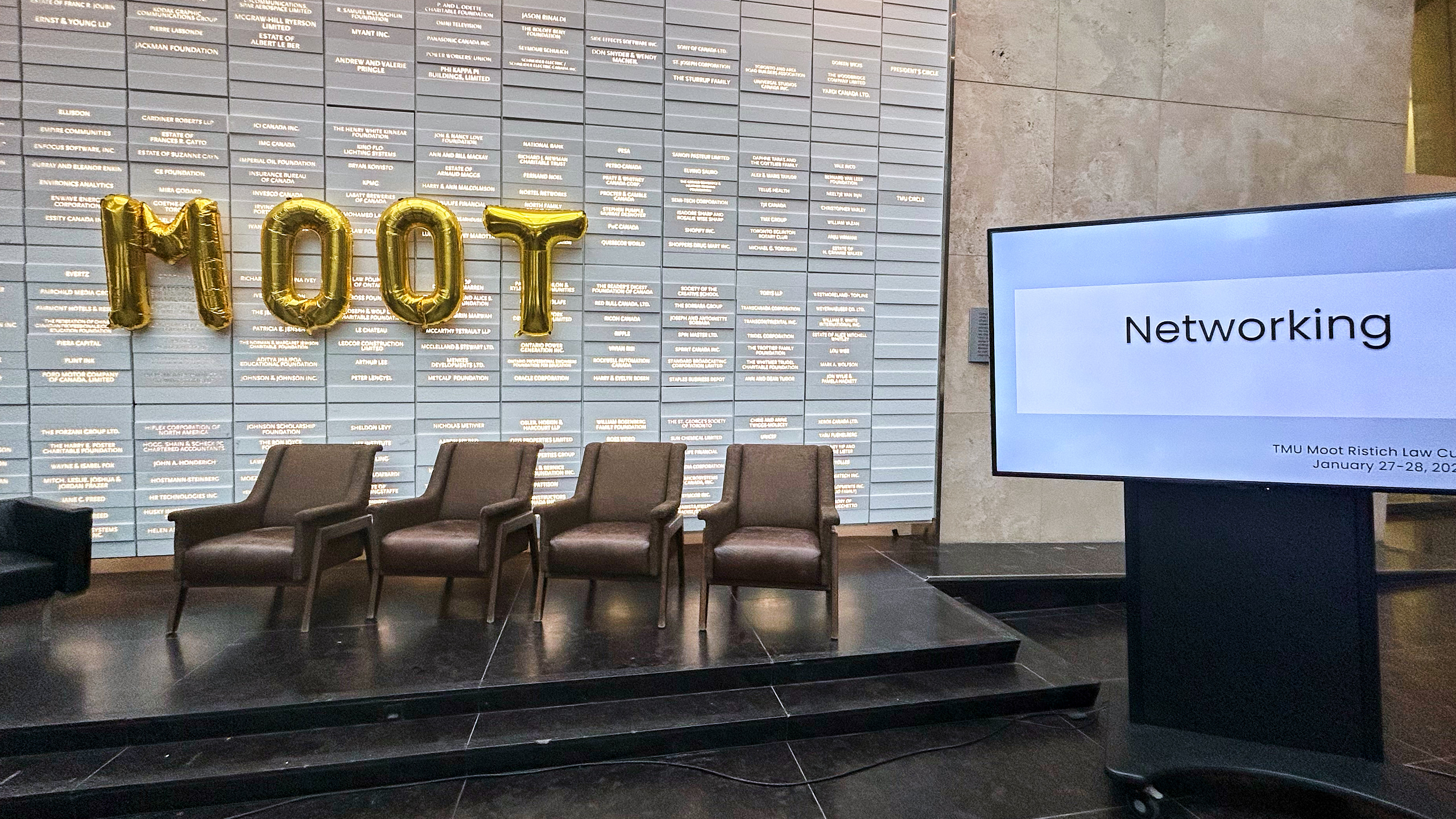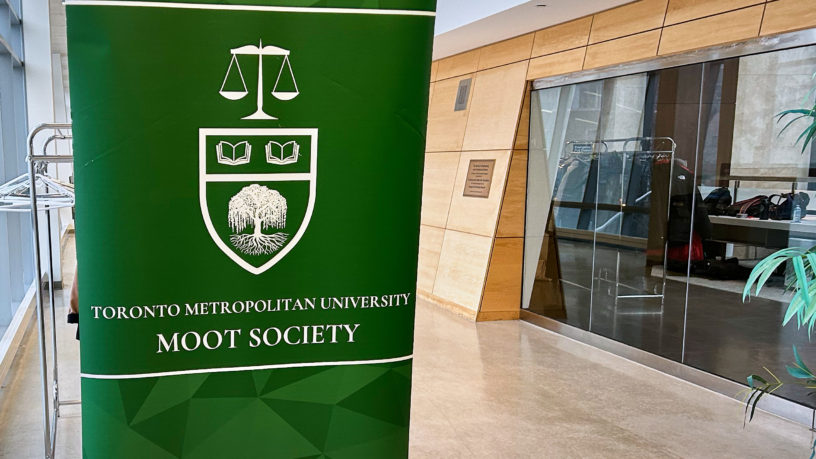By Vanessa Tiberio
Toronto Metropolitan University (TMU) welcomed 25 undergraduate students from across the province to partake in the Ristich Law Cup held by the TMU Moot Society on Jan. 27 and 28.
The oral advocacy competition took place on campus at the George Vari Engineering and Computing Centre.
Students from TMU, University of Toronto, York University and McMaster University competed against each other for a total cash prize of $600.
Participants competed in teams of two to present as the appellant or respondent in a legal case already decided by the Supreme Court of Canada in a real trial.
During the two-day event, the 13 teams presented their cases in front of a panel of judges made up of lawyers, law students and other industry professionals.
Mikayla Mifsud and Helen Wu from McMaster University won first place in the competition.
Second place went to TMU law and business student Patrick Francis, who competed alone in his first ever moot competition after his teammate dropped out.
Francis also picked up a distinguished oral advocate award presented by Bond University for his performance in the competition.
Mooting is a simulated court hearing where participants research a court case and prepare relevant material to present an oral argument either for or against the cases’ decision.
“I want TMU students to feel like they can compete with other university court teams and cement themselves as strong advocates”
This was TMU Moot Society’s first time hosting a moot competition for undergraduate students. The organization was founded in 2023 by fourth-year law and business student Andrew Scarlato and fourth-year global management student Victoria Moylum. Scarlato is now the president of the TMU Moot Society.
According to Scarlato, the pair started the society because he was competing in mock trials and moot competitions at other universities, then realized TMU didn’t have the same opportunities for students.
“After one of the moot competitions I did, I said, ‘Why don’t we have this at TMU?’” said Scarlato. “That’s where the idea started and then [Victoria and I] worked together to eventually create the group and make all the founding documents.”
TMU Moot Society gained student group approval from the Toronto Metropolitan Students’ Union (TMSU) in April 2023 and have worked since then to engage the student body by building an executive team and informing other students about the world of mooting.
They operate as administrators of moot rather than a competition team.
“A lot of other universities have moot court teams, but TMU doesn’t have any of that established yet, so our job as we see it is to build the foundations for those teams to come out,” said Scarlato.
The group held a few events prior to the moot competition, such as a tabling event during orientation week and a “How to Moot” information session. During these sessions, students were taught about mooting and engaged in practiced cases with legal professionals.
“Moot has never been available to undergraduate students at TMU before, so the way we see it, we’re taking TMU’s legal education to another level and bringing more opportunities to students that they didn’t have and that they would have to go to other universities to experience,” said Scarlato.
Moot court makes oral advocacy the focal point of competitions, according to the society’s website. Competitors at the Ristich Law Cup had about three weeks to prepare their arguments for the pre-assigned case. During the competition, each team had seven and a half minutes to present their arguments and two and a half minutes to rebut. Appellants and respondents were then judged on their arguments, speaking skills and rebuttals.
While moot competitions focus on law, any interested undergraduate student is welcome to compete—Scarlato said this is what makes the experience so valuable.
“The reason we focus so much on oral advocacy and not just legal advocacy is so that students from different disciplines can gain the skills they need to succeed in their lives and make their communities a better place,” he said.
Jen Lorestani, a York University Osgoode Hall Law School graduate and current articling student and judge at the Ristich Law Cup, has close to 10 years of experience mooting and judging competitions. She said she fell in love with mooting because of the many skills and experiences it gave her.
“Throughout the years, my confidence has gotten higher and I’ve seen other students who I’ve seen their confidence grow—it’s wonderful to see,” she said.
Lorestani said for undergraduate students interested in pursuing a legal career, mooting is a great first step for them.
“[Students] who moot before they go to law school have a much easier time just because they’ve already been exposed to case law—they’ve been exposed to these first principles coming from the Supreme Court,” she said.
Something unique to the cup is how participants were asked to complete a factum—a single-page written document that competitors submit to present their arguments. Lorestani said this is unique for an undergraduate moot competition to have.
“I’ve never seen it done at an undergrad moot, it usually happens at law school moots and it’s actually a requirement for most upper-year moots,” she said.
Spencer Nestico-Semianiw, a lawyer and Ristich Law Cup judge, said he thinks being exposed to a moot competition when he was an undergraduate student would have helped him decide if he wanted to pursue a legal career.
“It’s something that I wish I had done in university, but I frankly don’t even think the opportunity was available,” he said. “So I think for a lot of students, whether they’re interested in going to law school or not, it’s a good way to improve your advocacy skills, your public speaking skills or confidence.”
Nestico-Semianiw said he was honoured to judge the newly founded competition.
“I’m a very junior lawyer in my practice, so the idea that I’ve been selected to guest judge this is something that is meaningful to me and something I am very happy about,” said Nestico-Semianiw. “I enjoy giving back to the legal community to the extent that I can.”
Abdulhaddi Hassan, a first-year business technology management student at TMU, participated in his first moot competition at the Ristich Law Cup. Hassan said that at first, he was unsure of partaking in the competition as his teammate convinced him to do so. But after competing, he said he enjoyed the opportunity as it allowed him to step out of his comfort zone and think quickly on his feet.
“The judges had really good insight, they were able to make me feel more at home and calmed my nerves,” Hassan said.
Hassan also said that everything about the moot was great and that he would be interested in doing another moot in the future.
“For a first moot it was really well-polished. I think it could really help students get out of their comfort zone with a lot of things, like it did with me,” he said.
Alongside the mooting competition rounds, the weekend-long event held a panel discussion and a networking session, conducted by Bond University and TMU alumni, and served competitors breakfast and lunch.
Marzia Rahman is a first-year business management student at TMU who competed in mock trials during high school.
When she came across TMU Moot Society’s announcement that they were holding a moot competition, she knew she had to get involved.
“I loved it, it was very organized, and the judges were really sweet,” she said. “I’m hoping to major in the law and business program, so this is the perfect way for me to build on essential legal skills.”
Scarlato said that the TMU Moot Society is very pleased with the outcome of the event and that the team “met all of our goals for the competition and had extremely positive reviews from the judges and competitors.”
While many of the executives are in their final year of undergraduate studies, Scarlato said they intend to act as external advisors for next year’s teams.
“The team is extremely excited to carry on next year, taking what we learned from this year and making the group’s events even better next year,” Scarlato said.
Scarlato said the club’s goal for next year is to focus on making TMU students strong mooters so they can start winning competitions.
“I want TMU students to feel like they can compete with other university court teams and cement themselves as strong advocates,” he said.

CORRECTION: A previous version of this story said the distinguished oral advocate award Patrick Francis received was presented by both Bond University and Ristich Law for his performance in the competition. The award was presented by Bond University. The Eye regrets this error.










Leave a Reply